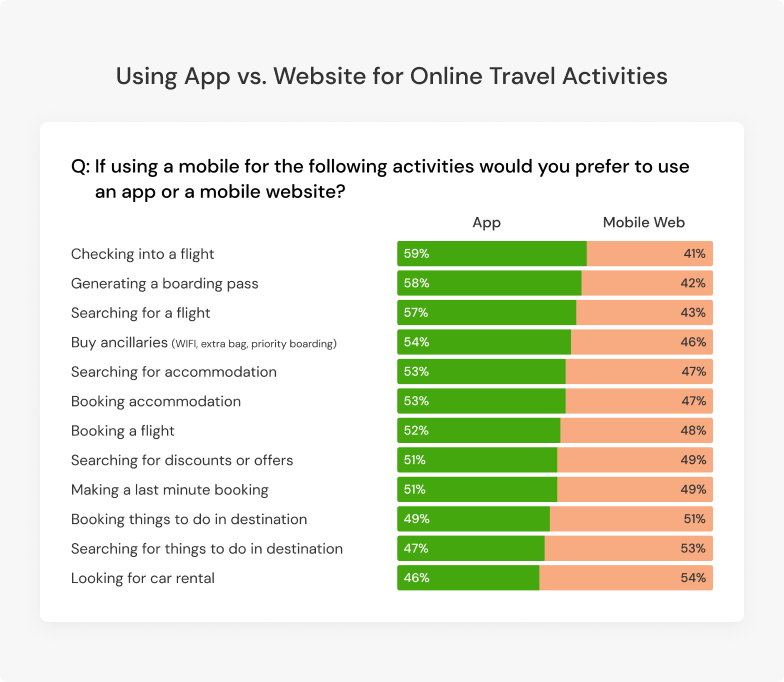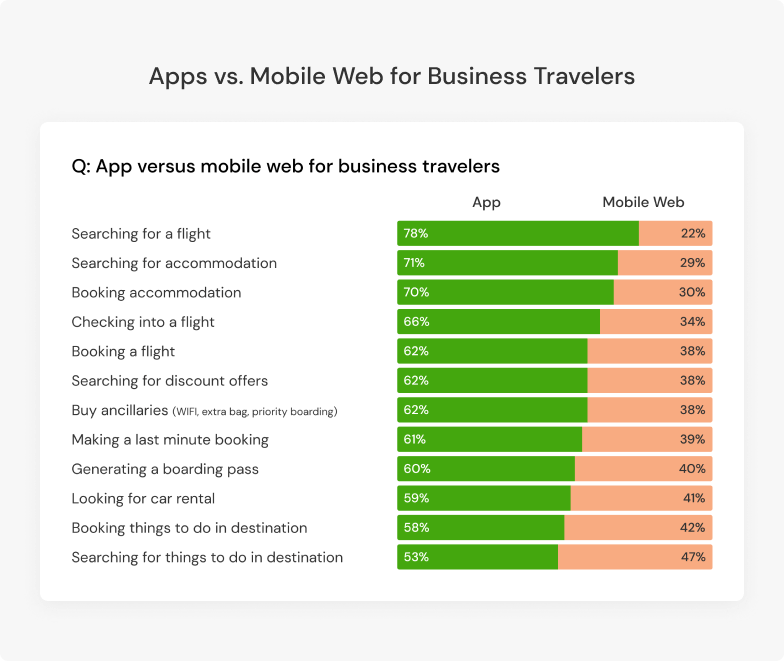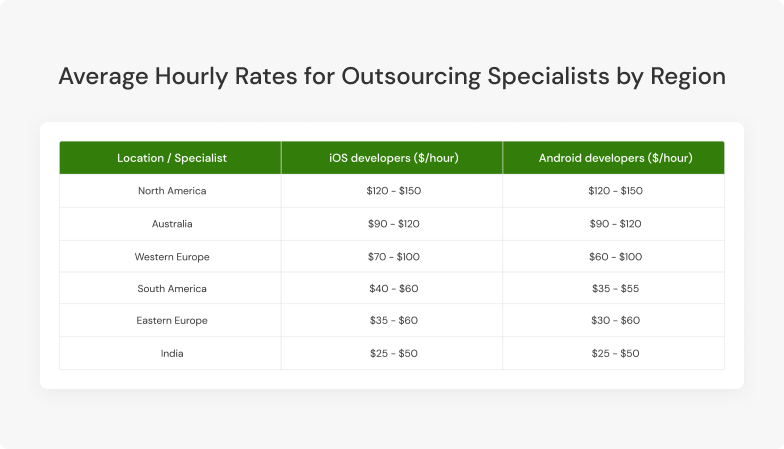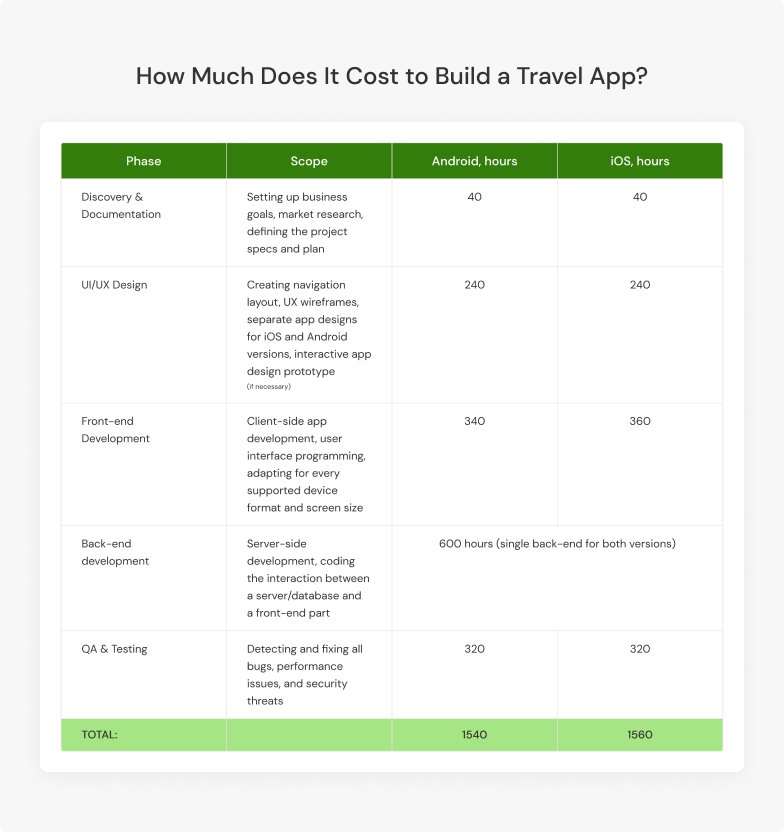There are no limitations that could make people refuse to travel. However, the new conditions due to the pandemic transform the industry and force the digitization processes towards self-service.
Booking travel tours, accommodation, transport tickets, and other touristic services through a mobile application is becoming the industry’s standard. Before you start creating your own product, find out what factors shape the travel app development cost and what budget you will need for such a project.
The Reasons to Invest in Travel Apps
Numerous reports show the stable growth rates for the mobile travel booking market are going to grow stably in the nearest decade. The ResearchAndMarkets statistics show a CAGR of 12.2% from 2021 to 2029, starting from $1,067.3 million in 2020. The last detailed research for the traveler’s online activity was conducted in 2019 by Travelport. Even two years ago, most online customers preferred using a mobile app for most of their activities:

Business travelers preferred using apps even more actively than leisure travelers:

The mobile-first approach is among the critical trends shaping the travel industry for the near future. There are multiple benefits for business that justify the cost of developing a travel app:
- Higher user attraction: there is no better way to connect customers to your business, as people stick to their smartphones 24/7.
- 24/7 business: within the mobile app, you can run business round the clock without physical limitations. Customers also appraise 24/7 availability.
- Personalization: mobile app technology gives more personalized services thanks to collecting user data for analysis.
- Streamlining business processes: a mobile app automates customer service and order processing, optimizing the team’s workflow.
- Efficient marketing: a mobile app is a powerful tool for location-based marketing, personalized push notifications, collecting user feedback, and analyzing user behavior to get insights for further brand promotion and new services development.
- Higher ROI: more personalized service, 24/7 accessibility, and easy user flows promote more bookings and drive higher ROI.
A mobile app that provides individual customer care, ease of use, fast order completion, and other benefits can become your competitive advantage among the rest providers.
Travel App Pricing Criteria
The project complexity is only one of the parameters that define the amount required for its development. There are a few other parameters of the cost to develop a travel app.
1. Features & Complexity
The set of features and their complexity define the time needed for development. The longer it requires, the more it will cost. These factors also determine how big the team is to be hired.
To save money on the initial development, you can start with building an MVP version. Minimum viable product includes the basic set of features enough to run your business through the app. For instance, a travel agency app can feature only product listings to book them without reviews, virtual trips, and other add-ons.
MVP helps save on expenses, deliver a mobile app faster to the market, and receive online orders quicker. It lowers the risks of significant losses related to the launch of a full app version without validating the idea in a natural environment. Find out more on how to build a travel app with suitable functionalities.
2. Development Approach
There are three available approaches for building a travel application. Here are they sorted by the price growing:
- App Builder: there are ready-made travel app builders that allow generating the software without any code skills. They lack some advanced features and customizability yet cost less than custom development.
- Hybrid technology: encapsulating a web app into a native container helps obtain a native-like mobile experience on both platforms (iOS and Android) within a single codebase. You do not need to develop different codes for each platform.
- Native technology: build a separate mobile app for each supported platform in native programming languages. It is the best way to use maximum hardware and platform capabilities.
The right choice of the suitable approach depends on the project requirements. For example, many clients tend to choose hybrid development as a cheaper alternative to native approach. Yet, adopting a hybrid framework to the needs of a complex travel app can end with a bigger budget than native development. That is why it makes sense to consult experts to choose the best tactics in each case.
3. Business Model
There are two most common business models for the travel industry:
- B2C: a ‘business to customer’ model implies direct providing your services to customers through some platform (a mobile app or website)
- B2B: a ‘business to business’ platform implies providing other companies’ services to customers through your platform. You do business on ‘reselling’ the products of other providers.
The cost for a B2B application will be higher due to integrating more third-party services to feed data from the original providers, exchange data between databases, etc. As a rule, it is 20% - 30% more in cost than B2C app development.
4. Expected Time To Market
If you are in a hurry to launch the ready-made app by a specific date, most likely, your team will be working on it under the pressure of a tight deadline. Moreover, you’ll need to hire more developers and other specialists to complete the whole scope of work faster. As a rule, tight deadlines increase the rates and the overall cost of the project completion.
5. Team Location and Size
The cost for the same services in IT significantly varies based on location. For example, the development cost of a travel app from US developers may cost a few times higher than doing the exact scope of work with developers from Eastern Europe. That is why, if you have a specific budget for a project, you can consider finding an outsourcing partner from the regions with lower rates. There are certain risks, yet you can manage them wisely.
Looking for outsourcing mobile app developers? Hire reliable and experienced experts from KeyUA.
Contact UsThe Rates For App Developers By Country
To build a native travel app for iOS and Android platforms, you will need to arrange a team of the following specialists:
- A project manager
- A UI/UX designer
- 1-2 back-end developers
- 1-2 Android developers
- 1-2 iOS developers
- 1-2 QA engineers
The exact number of specialists depends on the size and complexity of your project.
There are two ways of organizing a team: you may hire in-house specialists or outsource your project development to some remote team. In the second scenario, there are options to hire freelance individuals and adjust the teamwork. Otherwise, you can contract with an outsourcing company that will provide all required professionals from its staff.
The last option has a few benefits. You don’t need to spend time searching for each specialist, interviewing them, adjusting team management processes, etc. Also, the company you hire takes responsibility for the result as opposed to individual freelancers. Thus, it is safer, quicker, and often more professional.
Here are the approximate hourly rates for iOs and Android developers from different locations:

As you see, there is a big difference between regions, and it makes sense to consider outsourcing partners from cheaper regions. As for Ukrainian from Eastern Europe, its providers are one of the best in terms of quality-to-price ratio. The IT sphere in Ukraine is one of the most intensively developing.
The country provides comprehensive education for IT specialists, and local companies have in-depth expertise in mobile and web design, programming, and online marketing. The quality of delivered products equals similar solutions from the US or Western European providers.
When choosing a contractor, pay attention to the team’s relevant expertise, portfolio, and reputation.
How Much Does It Cost to Build a Travel App?
Let’s investigate the case of developing a native mobile travel application for iOS and Android platforms. While the app development lifecycle will be the same for any chosen approach, the timing and the scope of work may vary.
As a rule, the cost to build a travel app for the Android platform is 20-30% higher because it requires adjusting compatibility with more devices and screen formats and more testing.
Let’s say we need to create an application like Airbnb. Here are the estimated project phases:

For the approximate cost estimation, let’s take an average hourly rate for mobile software development in Eastern Europe, which is $50/h. So the total cost for developing iOS and Android versions will be $150,000 that is 300 hours at $50/h.
The development of a hybrid or a cross-platform application will be cheaper because it requires less resources. The suitable development approach should be selected upon the required features and other project specs.
The above estimation is given for a full-fledged native travel application with all necessary features on board. The development of an MVP version will cost $10,000 - $50,000 depending on the basic set of features you select.
The estimation for an actual project should be done individually based on your requirements. Send your specs to our software engineers to determine the exact cost to build a travel app for your business.
The Expenses Beyond Development
A new product launch is not only the development. There are a few more essential things to put in place, yet they are often omitted during the estimation:
- Research: launching a new product often implies serious market and competitors research, business analytics, and risk assessment.
- Marketing: promo campaigns, advertising, SEO-optimization, and other activities to develop intense brand loyalty and attract customers also requires investment.
- Maintenance and upgrades: as a rule, upgrading and maintaining the application after launch may take around 20% of the initial development cost.
Discuss these expenses with your outsourcing partner if you do not plan to delegate these activities to them.
Conclusion
Building a mobile application is a smart move for any travel business today. To rationalize investment into such a project, you’ll need to get a clear vision of your goals and the desired functionalities of the future app.
The cost also depends on the outsourcing team qualification and location. You need a well-reputed outsourcing partner with relevant expertise and a proven track record of successfully delivered projects. We are ready to provide you with all this. The KeyUA mobile developers are ready to deliver you an innovative, eye-catching, functional travel application.
Have an idea for building a travel application for your business? Consult KeyUA mobile development experts and start right away!
Contact Us







 Unit 1505 124 City Road, London, United Kingdom, EC1V 2NX
Unit 1505 124 City Road, London, United Kingdom, EC1V 2NX

Comments
Leave a comment